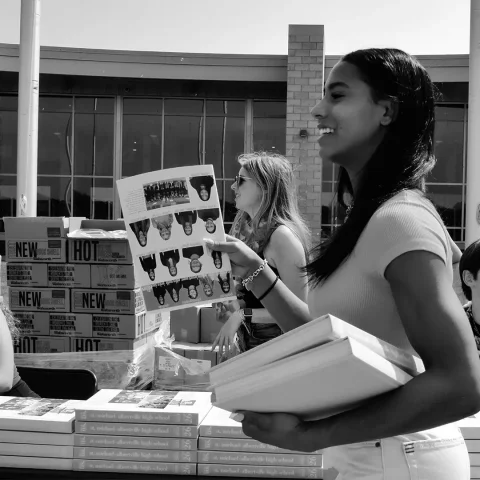The writer, Abby, told me they were like a family — sisters, really. But for some reason, I could not imagine a home with the closet space to accommodate the 32 members of the drill team. And there was another thing — something hard to place, like a melody to a familiar song but with slightly new wording.
Had I heard this story before?
Yes. It was the same drill team story that had graced the pages of every yearbook. For too long, we had been telling the same stories — homecoming, marching band, football — with the same angles. Each year they got a little face lift but no drastic surgeries. We were sick of hearing that the football team “just went out there and gave it 110 percent.” Tired of reading that the homecoming queen was “so surprised that she had won.”
Our writers used spell check and seemed to have the Associated Press Stylebook memorized, but their stories were just about as exciting as cardboard.
Example:
The marching band and drill team competed many times during the fall semester.
“We had a lot of fun and really bonded as a team,” Tiffany Tanner, senior, said.
Others agreed.
“I get really nervous before we perform, but it helps to know that we are all in it together. Even though we made a few mistakes, we still got the highest ratings possible,” Betsey Baden, junior, said….”
Stories like this appear in yearbooks across the country year after year after year. Change the names, vary the sentence structure and roll it out again.
And why is that? Mostly it’s because these organizations do basically the same thing every year.
The trick is being able to find the one piece of the story to latch onto. We’ve started calling it the nugget. And like any precious gem or metal, the copy editor often has to mine for it. Sometimes the nugget of the story is buried in the writer’s notes, an unused quote or a weak introduction—and that’s OK. If it means you get a tremendous story, it’s worth taking the time to dig to find it.
Although mining for the nugget of a story does not require a pick-axe or shovel, it is often tough. It calls for asking the right questions of the writer, because behind every good piece of writing is a great question. For that reason, the copy editor’s job does not stop at the end of the story. Editing must be accompanied by conferencing with the writer if the copy editor does not understand what the writer is trying to say.
Here are some questions we asked Abby in order to steer her away from telling a drill team story and move her in the direction of telling the drill team story:
Did you go to the marching band festival? No. Oh.
May I see your interview notes?
I see that Betsey said the team made mistakes. What did she mean by that? Were they major mistakes?
How did they get such a high rating despite this huge mess-up?
After a few minutes, the writer shared an amazing story of a drill member’s major error that turned into an award-winning solo. Interviews with the drill team member, Kyla Pitts, the drill team sponsor, another drill team member and a few hours gave the writer a great story. An excerpt…
“I’m standing there on the sidelines watching their performance,” Mrs. Connie Lutz, drill team sponsor, said, “and I see, out of the corner of my eye, Kyla start to dance. I’m thinking ‘Well, what is she doing?’ And she’s leaping, and she’s turning, and she’s spinning, and her flag is going everywhere. I could see the kids around her and their shoulders are going up and down because they were laughing hysterically. What a perfect way to cover a mistake, though. I mean, that was probably the best save in our drill team history. What a way to get a solo!”
Pitts performed her unanticipated solo, followed by the scheduled show. Afterward, the group left the field and watched as the judges wrote critiques about their performance. They earned all I’s, the highest rating possible.
“Ms. [Penny] Snead, Mr. [Britt] Haney, Mrs. Lutz, and Mr. [Doug] Talley all liked my solo so much that it is officially in the show and they actually lengthened the solo,” Pitts said. The rest of the team supported Pitts’ solo effort. They were a family, and they were proud of their ‘sister.’
Abby’s nugget was found in a weak quote, but sometimes, even after hours of poring over notes and asking questions, the story remains out of reach. As everyone is taught in fourth grade math classes, but most writers forget: sometimes, there is not enough information. That was Laura’s problem.
She was in a state of panic — for two hours, she sat with me, expecting the perfect answer. I did not have one. Laura had been assigned the cross country story and, despite her efforts, simply could not understand how the meets worked. To an outsider, the team seemed almost too easy to figure out. They were just boys in short shorts who like to run on bumpy paths. But to runners, cross country meant mathematical equations and hastily posted scoreboards. After a long talk and a few phone calls, we put Laura in touch with one of the injured runners. Since he would be sitting out at the state meet, he agreed to show her the untold story of cross country—while it was happening. Through quick thinking and communication, we had a story about the state champions.
Honestly, the process of finding the story of the year is difficult. Difficult, but not impossible. The thing that most writers do not understand, or maybe do not want to understand, is that the majority of mediocre copy comes from not being there. Without observing, we miss the details — the fabric that makes up our story. If Laura had not been there all day watching, seeing how quiet runner Jacob Brown was during a cross country meet, she would not have known to be surprised by his outburst as he waited for the scores to be posted. With this story, Laura learned that it is important to be there, to observe, not just to hear from other people.
But sometimes, writers miss the event that allows them to tell the ultimate story — the story that sums up the entire year in one glimpse. Even the most dedicated writer cannot be at every drill team performance. After Abby identified the nugget — the unexpected solo — she worked to move back in time by asking key players in the story to relive the moment.
Both writers were willing to rethink, revisit and rewrite their stories. Laura and Abby are typical writers on our staff; they are not afraid to throw out the first or the second draft and start over. They want to find the gold nugget.
Remember, the nugget of the story is found by living your writing assignment and knowing that the first draft is not usually the story, it’s just the beginning of the dig.



